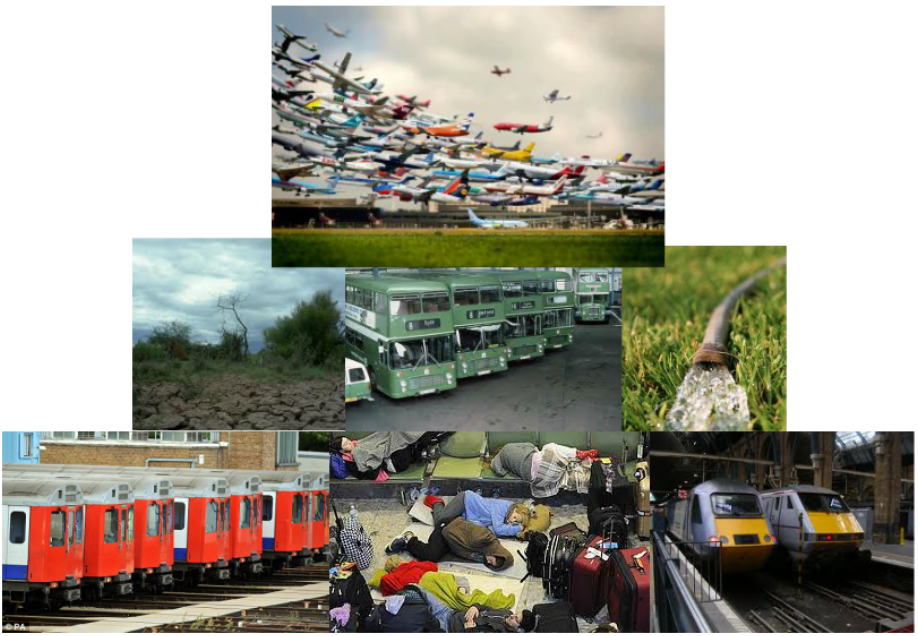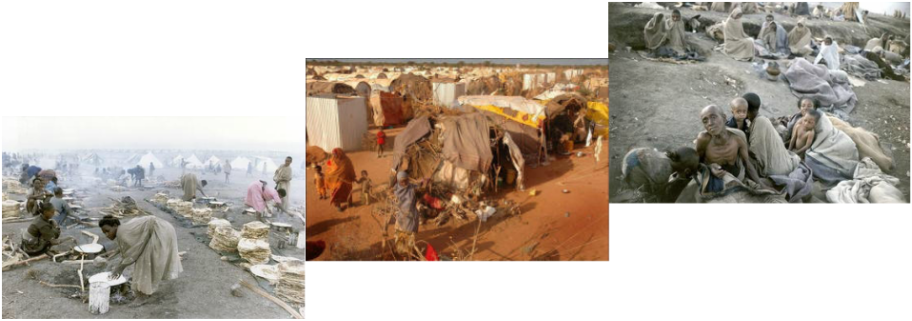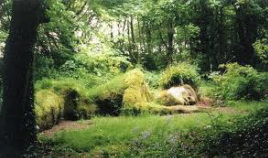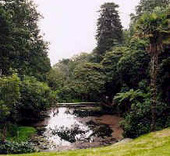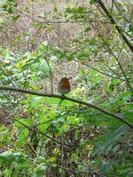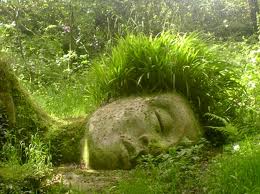- Home
- Site Index
- About Me
-
My Books
- Book List & Themes
- Strictly for Adults Novels >
-
Tales from Portlaw
>
- No Need to Look for Love
- 'The Love Quartet' >
-
The Priest's Calling Card
>
- Chapter One - The Irish Custom
- Chapter Two - Patrick Duffy's Family Background
- Chapter Three - Patrick Duffy Junior's Vocation to Priesthood
- Chapter Four - The first years of the priesthood
- Chapter Five - Father Patrick Duffy in Seattle
- Chapter Six - Father Patrick Duffy, Portlaw Priest
- Chapter Seven - Patrick Duffy Priest Power
- Chapter Eight - Patrick Duffy Groundless Gossip
- Chapter Nine - Monsignor Duffy of Portlaw
- Chapter Ten - The Portlaw Inheritance of Patrick Duffy
- Bigger and Better >
- The Oldest Woman in the World >
-
Sean and Sarah
>
- Chapter 1 - 'Return of the Prodigal Son'
- Chapter 2 - 'The early years of sweet innocence in Portlaw'
- Chapter 3 - 'The Separation'
- Chapter 4 - 'Separation and Betrayal'
- Chapter 5 - 'Portlaw to Manchester'
- Chapter 6 - 'Salford Choices'
- Chapter 7 - 'Life inside Prison'
- Chapter 8 - 'The Aylesbury Pilgrimage'
- Chapter 9 - Sean's interest in stone masonary'
- Chapter 10 - 'Sean's and Tony's Partnership'
- Chapter 11 - 'Return of the Prodigal Son'
- The Alternative Christmas Party >
-
The Life of Liam Lafferty
>
- Chapter One: ' Liam Lafferty is born'
- Chapter Two : 'The Baptism of Liam Lafferty'
- Chapter Three: 'The early years of Liam Lafferty'
- Chapter Four : Early Manhood
- Chapter Five : Ned's Secret Past
- Chapter Six : Courtship and Marriage
- Chapter Seven : Liam and Trish marry
- Chapter Eight : Farley meets Ned
- Chapter Nine : 'Ned comes clean to Farley'
- Chapter Ten : Tragedy hits the family
- Chapter Eleven : The future is brighter
-
The life and times of Joe Walsh
>
- Chapter One : 'The marriage of Margaret Mawd and Thomas Walsh’
- Chapter Two 'The birth of Joe Walsh'
- Chapter Three 'Marriage breakup and betrayal'
- Chapter Four: ' The Walsh family breakup'
- Chapter Five : ' Liverpool Lodgings'
- Chapter Six: ' Settled times are established and tested'
- Chapter Seven : 'Haworth is heaven is a place on earth'
- Chapter Eight: 'Coming out'
- Chapter Nine: Portlaw revenge
- Chapter Ten: ' The murder trial of Paddy Groggy'
- Chapter Eleven: 'New beginnings'
-
The Woman Who Hated Christmas
>
- Chapter One: 'The Christmas Enigma'
- Chapter Two: ' The Breakup of Beth's Family''
- Chapter Three: From Teenager to Adulthood.'
- Chapter Four: 'The Mills of West Yorkshire.'
- Chapter Five: 'Harrison Garner Showdown.'
- Chapter Six : 'The Christmas Dance'
- Chapter Seven : 'The ballot for Shop Steward.'
- Chapter Eight: ' Leaving the Mill'
- Chapter Ten: ' Beth buries her Ghosts'
- Chapter Eleven: Beth and Dermot start off married life in Galway.
- Chapter Twelve: The Twin Tragedy of Christmas, 1992.'
- Chapter Thirteen: 'The Christmas star returns'
- Chapter Fourteen: ' Beth's future in Portlaw'
-
The Last Dance
>
- Chapter One - ‘Nancy Swales becomes the Widow Swales’
- Chapter Two ‘The secret night life of Widow Swales’
- Chapter Three ‘Meeting Richard again’
- Chapter Four ‘Clancy’s Ballroom: March 1961’
- Chapter Five ‘The All Ireland Dancing Rounds’
- Chapter Six ‘James Mountford’
- Chapter Seven ‘The All Ireland Ballroom Latin American Dance Final.’
- Chapter Eight ‘The Final Arrives’
- Chapter Nine: 'Beth in Manchester.'
- 'Two Sisters' >
- Fourteen Days >
-
‘The Postman Always Knocks Twice’
>
- Author's Foreword
- Contents
- Chapter One
- Chapter Two
- Chapter Three
- Chapter Four
- Chapter Five
- Chapter Six
- Chapter Seven
- Chapter Eight
- Chapter Nine
- Chapter Ten
- Chapter Eleven
- Chapter Twelve
- Chapter Thirteen
- Chapter Fourteen
- Chapter Fifteen
- Chapter Sixteen
- Chapter Seventeen
- Chapter Eighteen
- Chapter Nineteen
- Chapter Twenty
- Chapter Twenty-One
- Chapter Twenty-Two
-
Celebrity Contacts
-
Thoughts and Musings
- Bereavement >
- Nature >
-
Bill's Personal Development
>
- What I'd like to be remembered for
- Second Chances
- Roots
- Holidays of Old
- Memorable Moments of Mine
- Cleckheaton Consecration
- Canadian Loves
- Mum's Wisdom
- 'Early life at my Grandparents'
- Family Holidays
- 'Mother /Child Bond'
- Childhood Pain
- The Death of Lady
- 'Soldiering On'
- 'Romantic Holidays'
- 'On the roof'
- Always wear clean shoes
- 'Family Tree'
- The importance of poise
- 'Growing up with grandparents'
- Love & Romance >
- Christian Thoughts, Acts and Words >
- My Wedding
- My Funeral
- Audio Downloads
- My Singing Videos
- Bill's Blog
- Contact Me
'Weather Wise'
From all of the countries on earth, I do believe the English to be the most inadequate to cope with 'out of the ordinary' weather conditions that come our way throughout the year. In many respects, it is our focus upon 'the four seasons' that is largely responsible for this. Somehow we have grown from child to adult compartmentalising the weather conditions that we should expect throughout the year. We grew up for the most part, experiencing warmth and showers during spring, heat in summer, the dry coolness of the mild autumn breeze from late September and October onwards, followed by the cold frost, biting winds and snow of winter. As the climate warms up however, the seasons will undoubtedly become wholly unpredictable. Places that have never before flooded will start to flood and the whole weather cycle will become unfathomable to all but the experienced weather forecaster .

In more recent years however, and presumably due to environmental changes in the earth's temperature and the melting of the ice cap, the consistency of English weather and the accuracy of British weather forecasts leave much to be desired. Nowadays, spring can witness new lambs prancing across the warm, lush farm fields and through the buttercup meadows one year, or the season can surprise both shepherd and flock while sheep shiver and starve as they remain trapped in drifts of deep snow that has been blown in by unexpected blizzards the next!
Whereas most summers gone by are filled with warm memories, today the once pleasing arrival of the sun can bring with it months of drought, leading to hose pipe bans and water shortage. Even if the weather climate accords with traditional English expectation, the power of those unions who influence the smooth travel of passengers from home to holiday destination are guaranteed to flex their muscles and enter into two solid weeks of disruption on the underground, the railways, the buses or the airports at the height of each holiday season. Sixty years ago, the overcrowded trains to the seaside could be relied upon to get one there in time, whereas today, it is possible to spend the first week of one's fortnight vacation living in the airport lounge while hundreds of planes fly round and round the airport skies with nowhere to land and little fuel in their tanks to remain in the air.
Whereas most summers gone by are filled with warm memories, today the once pleasing arrival of the sun can bring with it months of drought, leading to hose pipe bans and water shortage. Even if the weather climate accords with traditional English expectation, the power of those unions who influence the smooth travel of passengers from home to holiday destination are guaranteed to flex their muscles and enter into two solid weeks of disruption on the underground, the railways, the buses or the airports at the height of each holiday season. Sixty years ago, the overcrowded trains to the seaside could be relied upon to get one there in time, whereas today, it is possible to spend the first week of one's fortnight vacation living in the airport lounge while hundreds of planes fly round and round the airport skies with nowhere to land and little fuel in their tanks to remain in the air.
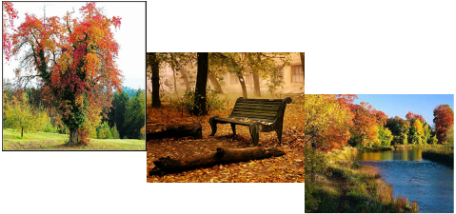
While the season of autumn still remains with us, there is no guarantee today that the apples will have been ready for picking or that the leaves on the trees were ready to leave their branches. These days, the autumnal sky can be filled with the flying kites of yesteryears or herald the signs of a Siberian winter in the making. Alternately, autumn can surprise the sun seeker with the warmth and humidity of an 'Indian Summer'. One just never knows precisely what to expect, apart from the unexpected; sunshine or rain, floods or drought?
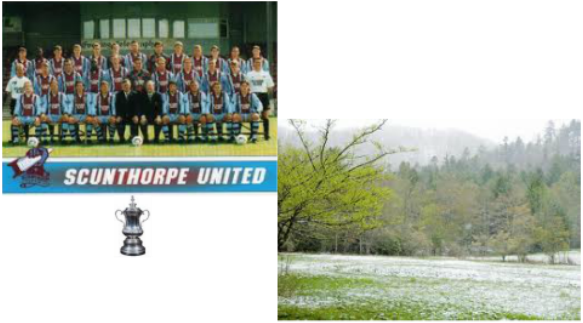
As for our winters, we never know what to expect anymore. There is no more 'traditional this' or 'traditional that', and frankly, there is less prospect of it snowing in England on Christmas Day than there is of Scunthorpe United winning the FA Cup! Indeed, the 'wrong type of snow' can bring the whole train network to a standstill, while a few fallen leaves from a belated autumn can prevent the train's wheels from gripping the rails well enough to move its engines. Give us three days of snow and the whole British economy is brought to the verge of collapse and every local authority in the country has run short of gritting sand.
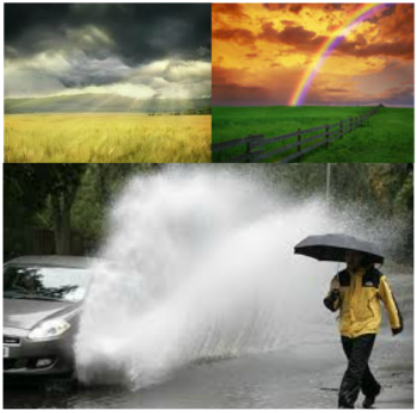
We have become so accustomed in England of our 'four seasons' following on in the order of their expectation that we somehow believe we British are immutable to the laws of climate change. Often, we forget how lucky we are as a country, whose climate throughout the year is far less extreme than other parts of the world. Indeed, we fail to recognise that the consequences of this climate supremacy we seem to have acquired is the most fortunate of blessings in disguise. When climate change comes through the door of an Englishman's castle, it usually makes contact with us like giving us a mild slap on the hand, whereas in other parts of the world, it can kick them in the face like a bucking bronco or a raging bull!

When we experience water shortage in England we are exposed to the horror of hose pipe bans for a few weeks or so. In other parts of the world however, the ravages of the sun annually produces widespread failure of crops, rampaging famine and unstoppable disease, along with millions of deaths.
A tornado occasionally hits England and in its progress, it may uplift a few flagstones, loosen a couple of roof tiles or even blow off a garage roof! In certain parts of the world, they are guaranteed tornadoes and hurricanes every year that wreak a pathway of destruction from Jamaica to the U.S.A., bringing in its wake, thousands of casualties, deaths, and the entire obliteration of towns and large geographical areas from the face of the map.
A tornado occasionally hits England and in its progress, it may uplift a few flagstones, loosen a couple of roof tiles or even blow off a garage roof! In certain parts of the world, they are guaranteed tornadoes and hurricanes every year that wreak a pathway of destruction from Jamaica to the U.S.A., bringing in its wake, thousands of casualties, deaths, and the entire obliteration of towns and large geographical areas from the face of the map.

Whatever the change in climate brings for us in England, thank God that the worst that ever seems to generally happen is deep snow that may last a week, the ground flooding of houses in areas that are built on flood plains, lots of drizzling rain or none at all, either no summer sun or too much, along with the infrequent need to change the hands of the house barometer. Elsewhere in the world, there will be earthquakes that kill millions, floods that cover the roof tops of tall dwellings and hurricanes, tornadoes, flash storms, forest fires, mud slides, snow blizzards, snow landslides, and tsunamies that crush livelihoods and scar the face of humanity for decades to follow.

And yet, despite being aware of all this, we English still remain preoccupied with the effect of the daily weather on our attitudes and lives. Like Noel Coward said in his most iconic composition, 'Mad dogs and English men go out in the mid-day sun'. Only the English are mad where the sun is concerned; doing things in it that more sensible folk would just never do, like basking in its wildest heat instead of sheltering in its shade. While we get sunburn in the heat of the mid-day sun, in other parts of the world they regularly experience the volcanic heat and eruption of hell fire itself as the raging mountains spit out their larva and decimate their population in the outflow.
Today, the sun was struggling to break through the dark sky above and make its presence known to us. Always remember that though our skies may sometimes darken, our horizons lie behind the rainbow that will inevitably follow that brief outburst of rain.
Today, the sun was struggling to break through the dark sky above and make its presence known to us. Always remember that though our skies may sometimes darken, our horizons lie behind the rainbow that will inevitably follow that brief outburst of rain.
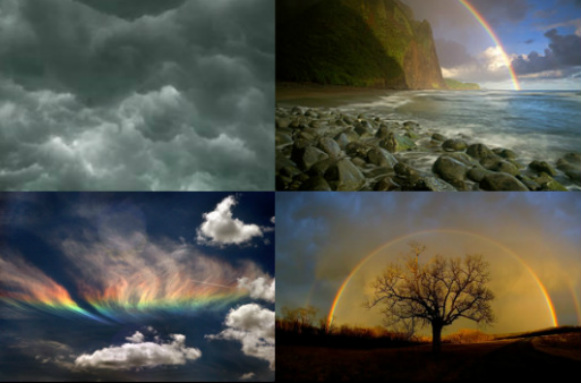
I often feel that the moods of the skies are but a mirror reflection of the soul of mankind. Just as human eyes are capable of showing what is and what has been, it requires imagination to entertain the thought of what is to come. Thus, that wide expanse called ‘sky’ is no more than a meteorological moment of majestic imagination; a barometer of the need to display all of nature’s temperament. Only the constant expression of genuine emotions can enable one to remain healthily anchored, allowing balance be restored. This is no different an interpretation than the rainbow and sun following the stormy expression of the sky.
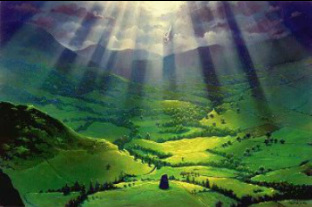
Thinking upon the weather and how it can affect us has preoccupied numerous writers and poets of days gone by. It is invariably the ‘ice breaker’ conversational opening when two strangers meet. Hard men and women from Scotland believe that it is being open to the hard grey weather, which blackens their stone that is responsible for any ‘harshness’ of character they possess. On the other hand, Ireland, the greenest land upon this planet, has the rain as much as the shamrock and St. Patrick to thank for their beautiful, lush landscape.
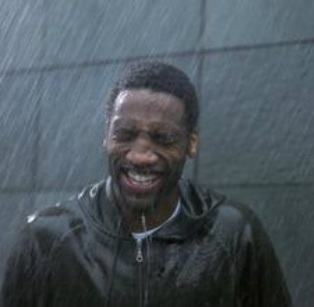
And what of Manchester, dear old Manchester! If it wasn’t for having the most rain downfall in the whole of Great Britain over the past hundred years that made it a place of prominence, Manchester may never have entered the minds of English men and women, and great painters like Lowry may have toiled away in the backstreets without their artistic work having ever been seen by folk south of Nottingham and the Black Country. Come to think of it, isn’t it strange that an artist like Lowry who lived and worked in the wet terraced streets of Salford, Manchester and who painted the busy lives and poverty of the Manchurians, only once painted a scene of rain, entitled,'The Bus Stop'? I find that fact puzzling when one considers the vast number of canvases this prolific artist painted during his lifetime and the wet days in Salford he experienced in abundance whilst doing so!
In my years working as a therapist and counsellor, one of the most intransigent problems that I came across was the illness called ‘Seasonal Affected Disorder’ or SAD as it is more commonly referred to. Being a lover of all our weathers, I always found it strange to see how the onset of the dark days and evenings brought with them such fear of being ‘out of the sun’ by the sufferer. In fact, come to think of it, I have yet to come across any person suffering from SAD who managed to cure themselves by their artificial sun light they surrounded themselves with inside their houses and which presumably cost an arm and a leg to buy.
In my years working as a therapist and counsellor, one of the most intransigent problems that I came across was the illness called ‘Seasonal Affected Disorder’ or SAD as it is more commonly referred to. Being a lover of all our weathers, I always found it strange to see how the onset of the dark days and evenings brought with them such fear of being ‘out of the sun’ by the sufferer. In fact, come to think of it, I have yet to come across any person suffering from SAD who managed to cure themselves by their artificial sun light they surrounded themselves with inside their houses and which presumably cost an arm and a leg to buy.
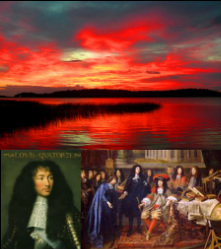
My historical interests remind me of Louis XIV who was better known as ‘The Sun King’; a monarch who knew how to maximise the concept of one of the most powerful planets of all. With the combined wisdom of an astrologist and a market manager, during the whole of his reign he forever made sure that he was never seen ‘out of the sun’ in the publicity of Court and populace.
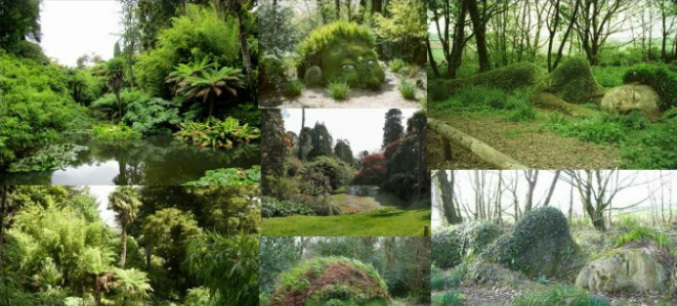
In my days as a ‘problem solver’, I frequently used the image of stormy weather in order to explain the principles of ‘conflict resolution’.
In fact one of the stories I find the most fascinating is invariably the tale documenting the story of some buried treasure, path, road or famous garden that has remained hidden beneath the soil for hundreds of years and is one day unearthed once more for man to tread by a sudden change in weather conditions. Its eventual discovery is assisted by some man-made clues that were incorporated into the natural landscape of the surrounding environment:
In fact one of the stories I find the most fascinating is invariably the tale documenting the story of some buried treasure, path, road or famous garden that has remained hidden beneath the soil for hundreds of years and is one day unearthed once more for man to tread by a sudden change in weather conditions. Its eventual discovery is assisted by some man-made clues that were incorporated into the natural landscape of the surrounding environment:
'The Way Through The Woods' by Rudyard Kipling
I love that poem and I never pass through any woodland area without Kipling's message coming to mind.
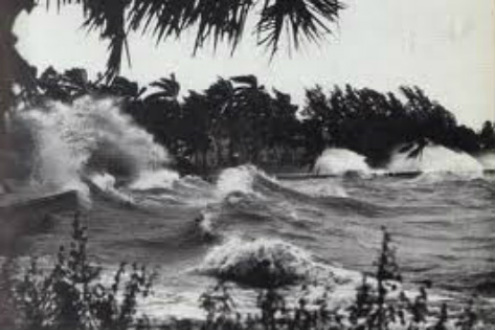
Between 2,000 and 2002, I was fortunate to work in liaison with the Minister for Youth Culture and Education in Jamaica. I travelled to the country twice and visited all thirty two schools in the poverty stricken Parish of Falmouth, the old slave capital. During my brief time there, which amounted to no more than mere months, I was gob smacked at the way the Jamaicans would shrug off a bad storm, especially through the hurricane season which came annually and without fail would destroy many homes and livelihoods in its wake.
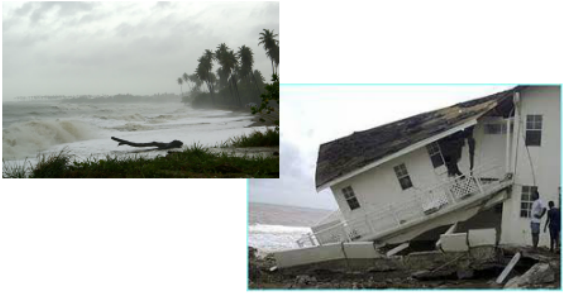
During bad storms and hurricanes of Jamaica, all those poor people who lived in dwellings made of tin and wood might lose their entire possessions, livelihoods and often their lives. And yet, do they move house area when the storm has subsided? In the main, most of them stay put with their lot, and after the storm has passed, they rebuild their tin shacks and resume their life once more. Not once, have I ever heard anyone from that country curse the bad weather and too regularly, intense rain knocks out their electricity supply and if one has no access to a generator, then darkness becomes the norm until the weather changes once more for the better. They don’t like it, but they accept it gracefully along with the other ten months of glorious sunshine, green pastures and yellow sands that nature provided them with to compensate for their material lack.

The Jamaicans impressed me as happy people. It is as though when they come from their mother's womb, they make up their minds there and then to adopt a smile and positive attitude and be happy, whatever the weather. It's as though they have taken the words straight out of one of Bob Marley's most popular songs and have fashioned and promoted a national attitude that says whatever the circumstances, 'Don't worry about a thing, because every little thing's gonna be alright.'
In the league of friendliness towards the stranger to their land, they are way out in front of many of the continental nations. It’s as if they don’t wait for people to be friendly first; they show them how. As they say in Falmouth, Jamaica, “Some are weather-wise and some are otherwise.”
Copyright William Forde April, 2012.
In the league of friendliness towards the stranger to their land, they are way out in front of many of the continental nations. It’s as if they don’t wait for people to be friendly first; they show them how. As they say in Falmouth, Jamaica, “Some are weather-wise and some are otherwise.”
Copyright William Forde April, 2012.

